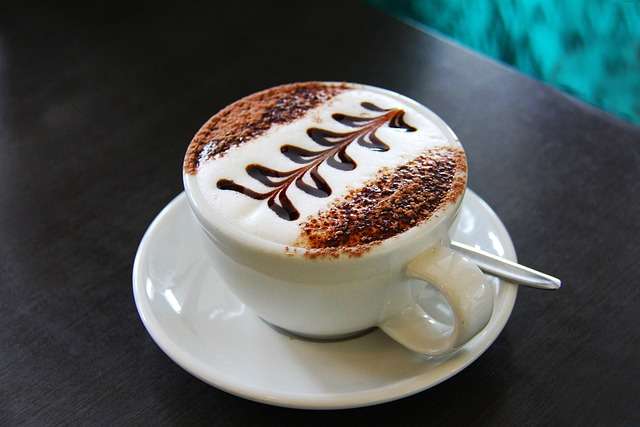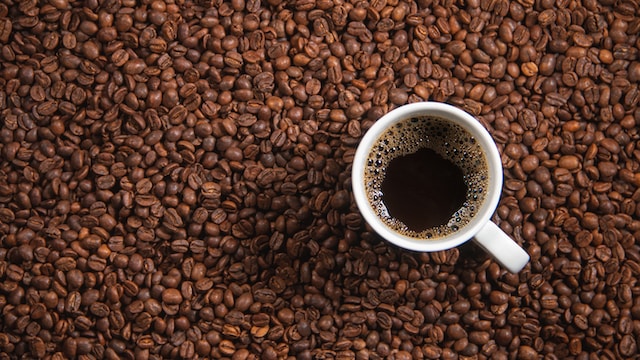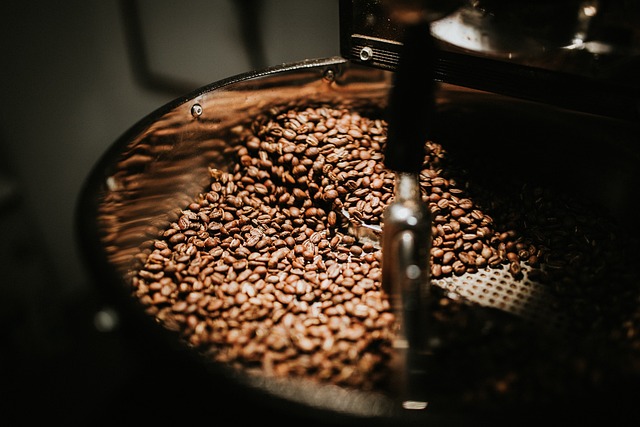Black and White Coffee: A Tale of Contrasting Flavors
Unveiling the Secrets Behind the Dark and Light Brews
Coffee lovers around the world are always on the lookout for their next caffeine fix, but within this vast realm of aromatic possibilities, two distinct brews stand out: black coffee and white coffee. While they share a common origin, these contrasting beverages offer unique flavors, aromas, and experiences. Let’s delve into the world of black and white coffee, exploring their origins, brewing methods, and the fascinating impact they have on our senses.

The Journey Begins: Origins and Legends
To truly appreciate the essence of black and white coffee, it’s important to understand their origins. Coffee, believed to have originated in Ethiopia, has an intriguing history that spans centuries. As the legend goes, a goat herder named Kaldi noticed his goats becoming lively after consuming the red cherries from a certain plant. Curiosity led him to taste the cherries himself, and soon the effects of caffeine were discovered.
The History of Coffee: From Ethiopia to Your Cup
Fast forward to the present day, and coffee has become an integral part of cultures worldwide. The brewing methods and flavor profiles have evolved, giving rise to various styles, including the black and white coffee we know today.
Black Coffee: Bold and Robust
When envisioning a classic cup of coffee, the image of a steaming black brew often comes to mind. Black coffee, as the name suggests, is consumed without any additions, offering an unadulterated taste that appeals to purists and those seeking a strong, robust experience. Its preparation is simple yet precise: finely ground coffee beans are brewed using hot water, resulting in a dark, full-bodied elixir.
How Coffee Is Made: From Bean to Brew

The Caffeine Kick and Health Benefits
One of the primary appeals of black coffee lies in its higher caffeine content compared to other coffee variations. Which Coffee Roast Has the Most Caffeine? The rich concentration of caffeine provides an invigorating jolt, making it a popular choice for early mornings and midday pick-me-ups.
In addition to its stimulating effects, black coffee offers numerous health benefits. Studies suggest that moderate consumption of coffee may contribute to a reduced risk of conditions such as heart disease and diabetes, and it may even enhance cognitive function and memory retention. Coffee and Your Brain: Unlocking the Mental Benefits
Mastering the Art: Brewing Tips and Techniques
Brewing black coffee to perfection requires attention to detail. The water-to-coffee ratio, brewing time, and temperature all play a crucial role in achieving the desired flavor profile. For a bolder cup, a higher coffee-to-water ratio and longer brewing time are recommended, while a milder taste can be achieved by adjusting these variables accordingly.
How to Make the Perfect Cup of Coffee: A Comprehensive Guide

White Coffee: A Subtle Symphony
In stark contrast to its dark counterpart, white coffee presents a delightful alternative for those seeking a milder flavor profile. White coffee refers to a specific brewing style that originated in Yemen and has gained popularity in recent years. The beans are roasted at a lower temperature and for a shorter duration than traditional coffee, resulting in a light-colored brew with a unique taste.
Is White Coffee Stronger Than Regular Coffee? Debunking the Myth
Unveiling the Unique Flavors
White coffee entices the senses with its subtle yet complex flavors. The shorter roasting time preserves the delicate notes of the beans, imparting a nuanced taste profile with hints of nuts, fruits, and even floral undertones. The resulting brew is less acidic and smoother on the palate compared to its darker counterparts.
Why Is My Coffee So Bitter? Exploring the Causes and Solutions
A Creative Canvas for Artful Compositions
White coffee’s light hue and gentle flavor make it an excellent base for creative concoctions. Baristas and coffee enthusiasts often use white coffee as a canvas to showcase their skills and imagination. From intricate latte art to innovative flavor infusions, the possibilities are endless when it comes to crafting delightful beverages using white coffee as the foundation.
Espresso Con Panna: A Delightful Blend of White Coffee and Whipped Cream
Mastering the Black Brew
Black coffee enthusiasts value the boldness and richness of this dark elixir. To achieve the perfect cup, attention must be paid to both the brewing techniques and the choice of beans.
The Pour-Over Method: Precision and Patience
One popular technique for brewing black coffee is the pour-over method. This meticulous process involves slowly pouring hot water over a filter containing freshly ground coffee. The water extracts the flavors and aromas as it passes through the grounds, resulting in a clean, vibrant cup of black coffee.
Aeropress vs. French Press: Comparing Two Brewing Icons
Best Coffee Beans for Black Coffee
The choice of coffee beans greatly influences the flavor profile of black coffee. For those seeking a bold and intense experience, dark roast beans such as French Roast or Italian Roast are ideal. These beans are roasted for a longer duration, resulting in a deep, smoky flavor with notes of chocolate and caramel.
Which Coffee Roast Has the Most Caffeine? Debunking the Myths
Alternatively, medium roast beans like City Roast or Full City Roast offer a balance between acidity and richness, showcasing the beans’ inherent characteristics. Light roast beans, such as City+ or Light City Roast, provide a brighter and more nuanced flavor profile with fruity and floral notes.
What Coffee Has the Least Caffeine? Busting the Common Misconceptions
Unveiling the Art of White Coffee
White coffee’s delicate and nuanced flavors require a different approach to brewing. The aim is to preserve the subtleties of the beans and highlight their unique characteristics.
The Slow and Gentle Roasting Process
White coffee is made from lightly roasted beans, where the roasting process is intentionally shorter and at a lower temperature. This preserves the beans’ natural flavors and imparts a mild yet distinctive taste. The result is a brew with a light, golden color that showcases the subtle nuances of the beans.
How to Make Black Coffee for Weight Loss: Unveiling the Secrets

Best Coffee Beans for White Coffee
When it comes to white coffee, the choice of beans is equally crucial. Opt for beans that have been specifically labeled as white coffee beans or light roast beans. These beans are usually sourced from regions known for their delicate and floral flavor profiles.
The Benefits of Drinking Decaf Coffee: Myths and Truths
Some popular choices include beans from Yemen, Ethiopia, or specialty varieties such as the Geisha or Bourbon beans. These beans exhibit nuanced flavors, with notes of jasmine, citrus, and honey, perfectly complementing the gentle nature of white coffee.
Where Coffee Was Invented: A Journey Through History
Embrace the Contrast
As we continue to explore the captivating world of black and white coffee, we come to appreciate the contrast and diversity that each brings to our coffee experiences. Whether you prefer the boldness of black coffee or the delicate symphony of white coffee, understanding the brewing techniques and choosing the right beans allows you to unlock the full potential of your brew.
Black Coffee: A Ritual of Simplicity
Black coffee has long been a staple in many cultures, and its consumption often carries a sense of ritual and tradition. Across different regions and communities, black coffee has woven itself into the fabric of daily life, accompanying various customs and ceremonies.
The Morning Wake-Up Call
For many, the ritual of starting the day with a cup of black coffee is essential. It serves as a morning wake-up call, preparing both the mind and body for the day ahead. The aroma and flavor of black coffee can invigorate the senses, providing a moment of quiet reflection and preparation before diving into the demands of the day.
Coffee Before or After a Workout: The Pros and Cons
Social Bonding and Conversation
Black coffee often acts as a catalyst for social interaction and conversation. It brings people together, whether it’s meeting friends at a coffee shop, gathering with colleagues during a work break, or enjoying a quiet moment of connection with a loved one. The simple act of sipping black coffee fosters camaraderie and encourages the sharing of thoughts, stories, and laughter.
How Many Calories Are in Coffee? Debunking the Myths

White Coffee: A Symphony of Tradition
While white coffee may be less widely known, it too carries its own set of customs and traditions in certain regions. These customs highlight the unique qualities of white coffee and enhance the experience of savoring this delicate brew.
Cultural Ceremonies
In some cultures, white coffee is an integral part of ceremonial events and celebrations. It is often served with meticulous attention to detail, employing specific brewing methods and serving rituals. These traditions elevate the act of enjoying white coffee to a deeply meaningful and cherished experience.
Is Espresso Black or Brown? Unveiling the Truth
Symbolism and Hospitality
White coffee, with its light hue and subtle flavors, has come to symbolize hospitality and warmth in certain communities. It is often offered to guests as a gesture of welcome and appreciation. Sharing a cup of white coffee signifies a connection and openness between individuals, fostering a sense of community and togetherness.
Is Coffee Acidic, Basic, or Neutral? Demystifying the pH
The Beauty of Diversity
The beauty of black and white coffee lies not only in their flavors but also in the diverse cultures and customs that surround them. Whether it’s the robust simplicity of black coffee or the delicate symphony of white coffee, these beverages have embedded themselves into the daily lives and traditions of people around the world.
As you embark on your own coffee journey, take the time to savor the rituals, embrace the customs, and celebrate the rich tapestry of coffee culture. From the first sip to the last drop, black and white coffee continue to captivate our senses, connecting us to the past and weaving themselves into the fabric of our present-day experiences.
Cheers to the world of black and white coffee, where every cup tells a story!

FAQ (Frequently Asked Questions)
Q: What is black and white coffee? A: Black coffee refers to coffee brewed without any additives, such as milk or sugar. It is enjoyed in its pure form. White coffee, on the other hand, is a specific brewing style that involves lightly roasting the beans, resulting in a light-colored brew with a delicate flavor.
Q: Who is the owner of black and white coffee? A: Ownership of black and white coffee brands may vary. There are numerous coffee companies and cafes that offer black and white coffee options. It’s best to refer to specific brands or establishments to determine their respective owners.
Q: Is white coffee just coffee with milk? A: No, white coffee is not simply coffee with milk. While both black and white coffee are made from coffee beans, white coffee refers to a specific brewing technique that involves lightly roasting the beans. It is distinct from coffee with milk, which typically refers to black coffee that has been combined with milk or other dairy products.
Q: Is black or white coffee stronger? A: In terms of caffeine content, black coffee generally has a higher concentration of caffeine compared to white coffee. The strength of the coffee flavor, however, can vary depending on personal preference and the specific brewing methods used.
Q: What is in a Starbucks black and white? A: The Starbucks Black and White Mocha is a specialty beverage that combines espresso, steamed milk, dark and white mocha sauces, and whipped cream. It is a rich and indulgent coffee treat.
Q: What is black coffee with milk called? A: Black coffee with milk is commonly referred to as a “coffee with milk” or “café au lait.” It is created by adding a portion of milk or steamed milk to black coffee, resulting in a creamier and slightly milder flavor.
Q: What is a black coffee without milk called? A: A black coffee without milk is simply referred to as “black coffee.” It is enjoyed without any milk or dairy additives, allowing the full flavor and characteristics of the coffee beans to shine through.
Q: Is black coffee healthier than milk coffee? A: The health benefits of coffee can vary depending on individual factors and consumption patterns. Black coffee is low in calories and free from added sugars and fats, making it a healthier choice in terms of caloric intake. However, the addition of milk can provide additional nutrients and contribute to a balanced diet.
Q: Which coffee is best for health? A: Coffee, when consumed in moderation, can have various health benefits. Both black and white coffee can be enjoyed as part of a healthy lifestyle. The key is to avoid excessive sugar and cream additions and opt for high-quality coffee beans.
Q: What drink is healthier than coffee? A: Several beverages offer potential health benefits as alternatives to coffee. Herbal teas, such as green tea or chamomile tea, are known for their antioxidant properties. Matcha tea and yerba mate are also popular choices known for their energizing effects.
Q: What is the healthiest coffee option with milk? A: When considering the healthiest coffee option with milk, it’s important to opt for lower-fat milk varieties, such as skim milk or plant-based alternatives like almond or oat milk. These choices provide a creamy texture with fewer calories and saturated fats compared to whole milk or cream.





